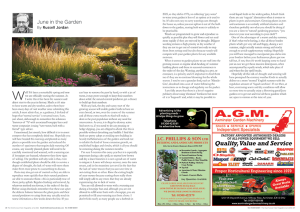
Well! It’s been a remarkable spring and now we are officially starting the summer. As I write this it has been the sunniest and driest start to the year in history. Much as it’s nice to have warm and dry weather, unless there have been many days of wet weather since submitting this article, I must admit that, as a gardener, I do kind of hope that ‘normal service’ is resumed soon. I am, just about, old enough to remember the infamous ‘Summer of ‘76’ with associated hosepipe bans and water companies issuing “save water; bath with a friend” type advice.
I mentioned, last month, how difficult it is to rewet compost that has completely dried out. Hopefully you will have heeded this warning and planted as many plants as possible into the garden and reduced the number of specimens that require daily watering. Of course, any recently planted plants will need to be carefully monitored and watered, with a watering can if hosepipes are banned, whenever they show signs of wilting. The problem with dry soils is that, even though established plants should be able to survive a degree of drought, the lack of water will stress them make them more prone to succumbing to disease.
Pests may also get out of control as they are able to reproduce more quickly than their natural predators are able to consume them—this is particularly true of those pesky aphids. Regular checking and removal, by whatever method you favour, is the order of the day. Before using chemicals remember that these can upset the delicate balance between the plant pests and their natural predators so using them may actually result in worse infestations a few weeks down the line. If you can bear to remove the pest by hand, or with a jet of water, it may prove enough to keep their numbers down while the natural control predators get a chance to build up their numbers.
With any luck, the dry and sunny start of the growing season will enable garden birds to have an extra brood, or two, over the course of the summer and all those extra mouths to feed will make a dent in the pest population without any need for intervention. As ever, it is illegal to destroy active bird nests so, if you need to do any pruning or hedge clipping, you are obliged to check that this is possible without disturbing any birdlife. I find that birds are pretty adept at avoiding nest building in heavily trafficked areas of the garden and tend not to inhabit the kind of loose extension growth, on established hedges and shrubs, which is all you should be removing during the summer months.
I’m sure I mention this every year but it is especially important during a dry spell; no matter how brown and dry a lawn becomes it is not a good use of water to irrigate it. Lawns will always recover, once the rains return, and in the meantime just revel in the fact that the lack of water means that you can save time in not cutting them so often. Raise the cutting height of your mower because cutting them really short will simply add to any stress that they are already experiencing due to lack of water.
You are still allowed to water with a watering can during a hosepipe ban and, although you are not allowed to refill water butts with a hosepipe, you are permitted to fill your watering can from a hose. I don’t think nearly as many people use a bathtub in 2025, as they did in 1976, so collecting ‘grey water’ to water your garden is less of an option as it used to be. It’s also not easy to carry watering cans through the house so, unless you can siphon it out of the bath down to the garden, reusing bath water is unlikely to be practicable.
Weeds are programmed to grow and reproduce as quickly as possible plus they will flower and set seed more rapidly if they are stressed by drought. Diligent weeding remains a high priority in dry weather if they are not to get out of control not only to stop them from setting seed but also because weeds will compete with your garden plants for any available moisture.
When it comes to garden plants we are well into the growing season so regular dead-heading of summer bedding plants and those in seasonal containers is the order of the day. Watering anything in a pot, or container, is a priority and it’s important to feed them too if they are to continue blooming for the whole season. I tend to use a granular feed, such as ‘Miracle-Gro’, dissolved into a can of water following the instructions as to dosage and regularity on the packet.
I am fully aware that there is a lot of negative publicity about using ‘chemical’ fertilisers but most of it is ‘hogwash’ and, while it may be possible to avoid liquid feeds in the wider garden, I don’t think there are any ‘organic’ alternatives when it comes to plants in pots and containers. Growing plants in pots and containers is an entirely artificial situation and therefore probably not what you should be doing if you are a slave to ‘natural’ gardening practices; “you must cut your coat according to your cloth”!
One of the advantages of a warm and dry summer, if that’s what we’re having, is that all those border plants which get very tall and floppy, during a wet summer, might actually remain strong and stocky enough to avoid supplementary staking. Hopefully you will have managed to incorporate pea-sticks into your borders before your herbaceous plants got too tall but, if not, then it’s worth keeping some to hand just in case we get those massive downpours, often accompanied by squally winds, which take place if and when the dry spell breaks.
Hopefully all this talk of drought and watering will have prompted the contrary weather Gods to actually deliver us a more ‘normal’ English summer with the regulation amount of ‘liquid sunshine’. If not then, at least, continuing warm and dry conditions will allow us more time to actually enjoy a blooming good June garden or to get out and visit all those gardens which are open to visitors at this time of year.



